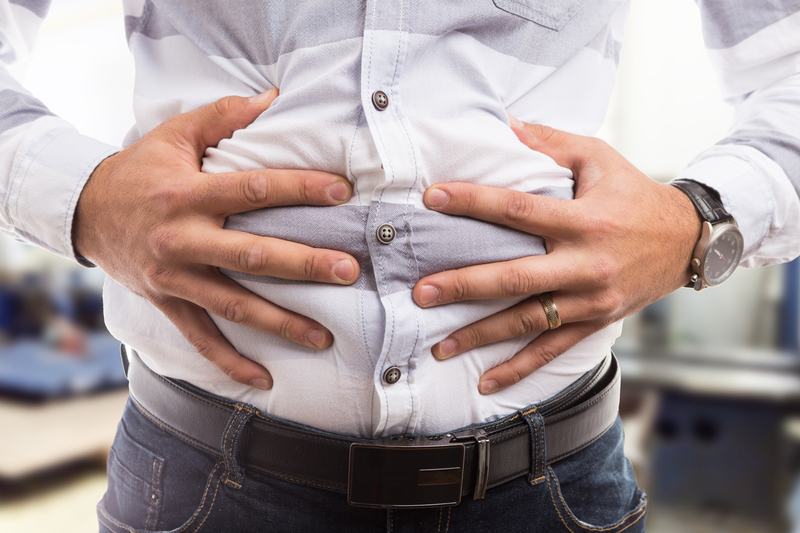How to Reduce Bloating After Eating (10 Helpful Tips)

No one likes the feeling of a tight, full belly from gas buildup in the GI tract. It not only makes your belly look larger than usual, it can also feel uncomfortable and even painful. And it’s likely combined with the need to release gas (i.e., belch or fart), which isn’t exactly socially friendly in most circles. So, how can you reduce bloating, or better yet, avoid bloating to begin with? And are there any long-term solutions for those who suffer from bloating regularly?
What Causes Bloating?
Bloating is common and happens to the best of us every so often, although not often spoke about.
There are several common causes for bloating, including:
- Constipation
- Food allergies or food intolerances
- Diet changes
- Not enough (or perhaps too much) fiber
- Swallowing air
- Fizzy drinks
- Overeating or eating too fast
- Hormonal changes (such as before or during menstruation)
How to Reduce Bloating Quickly
If you’re already bloated, you probably want to reduce bloating fast. Bloating caused by a recent meal typically resolves itself over time (perhaps overnight), but there are steps you can take to reduce bloating even faster.
For example, try walking it off. Moving the body can help get both the blood flowing and digestion moving, which can quickly help reduce bloating. If you don’t have time for a long walk, even a short jaunt around the block can help relieve pressure in the abdomen.
If you can’t get outside due to weather or location (or just don’t feel like walking right now), certain yoga poses have also been shown to help. A few to try include child’s pose, happy baby, knee to chest pose, seated forward fold, twists (standing or seated), garland pose (i.e., a deep squat), or any other poses that help stretch the abdominal muscles.
If you’re feeling a little gassy before going out, you can do a series of these poses to help release the pressure in the privacy of your own home.
Especially if you’re feeling uncomfortable, an abdominal massage may help get things moving. Start by lying down on your back with your knees bent. Begin by breathing deeply. Then place your hands just above your right hip bone. Apply light pressure and rub in a circular motion, working your way up to your ribcage. Continue massaging as your hands travel across your upper abdomen and over to the left side of your ribcage. Then slowly travel down to the left hip bone and continue circling the entire abdomen. Repeat as long as necessary, or comfortable, but stop immediately if it’s painful rather than soothing.
Releasing stress can also help reduce bloating. To help, try some deep breathing, meditation, earthing, forest bathing, a sauna, or even soaking in a warm bath to relax and let go.
Other options to relieve bloating quickly include relaxing the intestinal muscles with peppermint tea or capsules (though if you also have heartburn, peppermint can make it worse). Fennel and curcumin are two other herbal products that may help reduce bloating.
How to Avoid Bloating Long Term
If the quick fixes aren’t working or if you suffer from bloating regularly, you may need a longer-term approach. Certain lifestyle habits can make bloating better or worse. For example, these steps may help you avoid bloating long term:
1. Watch Your Fiber Intake
Eating more fiber can help prevent constipation, reduce bloating, and provide a wealth of other benefits. Yet most people don’t eat nearly enough fiber day to day, and jumping whole-heartedly into a high-fiber diet is far from a good idea. In fact, it can lead to more gas, bloating, and constipation.
Instead of going from zero to 100, gradually increase your fiber intake to the recommended 25 grams per day for women and 38 grams per day for men. And if you fall back to eating less, gradually increase it again.
Good sources of fiber include vegetables such as cauliflower and broccoli, seeds like chia and flax, legumes like lentils and beans, and of course, whole grains.
Don’t continue eating more and more fiber, though, as too much fiber can also lead to increased gas and bloating. Top limits are around 70 grams of fiber per day.
2. Avoid Carbonated Beverages
Many folks have found the easiest, tastiest way to drink more water is to consume carbonated seltzer waters. Unfortunately, any carbonated drinks—from seltzers to sodas—can lead to a gas build-up in the stomach and intestines. Both regular and diet sodas are double offenders as sugars and artificial sweeteners can also lead to gas and bloating.
If you regularly enjoy bubbly drinks yet experience belching, gas, and bloating, switch to still water instead, which has been shown to help reduce bloating, gas, and constipation.
For even better tummy soothing results, switch from ice cold water to room temperature or even lukewarm water, especially with meals, so you don’t cool down your digestive system while it’s working and dilute your digestive enzymes. If you don’t enjoy plain warm water, how about a nice cup of hot tea with your meal?
3. Give Up the Gum
Chewing gum has some surprising benefits (from protecting teeth to boosting brain power), but it can also have some drawbacks. One of the biggest is increased bloating as it’s easy to accidentally swallow air as you chew. In addition, the sugar alcohols found in many gums, such as xylitol, sorbitol, and mannitol, can also lead to bloating and stomach discomfort for some folks.
Other common ways people tend to swallow air, which then leads to bloating, are by using a straw or drinking or eating too quickly. Avoid using straws if you tend to regularly bloat. And the recommendation to slow down, eat mindfully, and completely chew your food is good advice whether you’re feeling bloated or not.
4. Move More
In addition to a walk or yoga session helping reduce bloating quickly, exercising regularly can also help the body move food and waste through (and out) the body more efficiently. It can also help reduce water retention as you sweat.
Aim for at least 20 minutes of movement per day, working your way up to a total of at least 150 minutes per week.
Just remember to stay hydrated by drinking plenty of water both before and after your activity, especially if you are exercising in the heat or sweating a lot.
5. Support a Healthy Gum Microbiome
When we eat high-fiber foods, we’re actually feeding and boosting our gut microbiome. Ensure your microbiome is getting the fuel it needs by consuming healthy pre- and probiotics.
Certain probiotic strains found in fermented foods and drinks (e.g., Greek yogurt, kimchi, kefir, or sauerkraut) have been shown to help ease bloating and keep the belly flat.
Of course, what you don’t eat is just as important. Common foods that can wreak havoc on the microbiome and increase bloating include refined sugars, lactose (as found in dairy), and gluten (found in wheat-containing foods like breads and pasta).
6. Consume Natural Diuretics
Some foods can help decrease water retention as well as support improved digestion. A few to add to the menu to help prevent bloating are asparagus, celery, fennel, lemon, and honeydew melon. You can also use fennel seeds to make a delicious tea.
Foods high in potassium may also help release sodium, and decrease water retention to help reduce bloating. Add bananas to smoothies, eat up some avocado toast, or enjoy some baked sweet potatoes as part of your next meal or snack for a tasty source of potassium.
7. Keep a Food Journal
Often, unknown food intolerances can lead to bloating, gas, and stomach distress. Common causes include diary products (due to a lactose intolerance) and breads (due to gluten intolerance) as well as eggs and fructose. Yet other foods that your body has trouble digesting can also cause these problems. Keep a journal to help you find the food(s) that could be contributing to increased bloating and discomfort.
While you’re journaling, don’t overlook supplements as well as medications which could be impacting your digestion. Some supplements (e.g., iron) can lead to increased digestive issues.
Other supplements may help reduce them, such as:
- Potassium
- Magnesium citrate
- Bitter herbs like dandelion, burdock, and gentian root
- Probiotics
- MCT oil
- Digestive enzymes like protease, amylase, lipase, and bromelain
8. Switch to a Low-FODMAP Diet
If your bloating persists, you may be having a difficult time digesting a type of carbohydrates called FODMAPs. Switching to a low-FODMAP diet at least temporarily may help reduce symptoms like bloating, gas, and stomach distress.
Many healthy foods can be high in FODMAPs, including beans, Brussels sprouts, and other fruits and veggies. So as your gut health improves, you may want to slowly, gradually add these types of foods back into your diet, watching carefully to ensure the bloat doesn’t return.
9. Add Some Spice
Spices like turmeric, cayenne pepper, anise, caraway, coriander, fennel, and ginger not only make foods more flavorful, they may also help reduce bloating. Cayenne pepper, for example, has been shown to help stimulate digestive juices and ease gas, which may help reduce the pressure, pain, and cramping from bloating.
In addition, spicing up meals makes it easier to cut back on salt. Salt isn’t necessarily the villain often proclaimed, but too much salt can lead to water retention and bloating. So, set aside the salt shaker and use spices instead to flavor your foods to help reduce bloating.
10. Watch Your Medical Conditions
A number of medical issues can lead to or worsen bloating. Work with your preferred healthcare practitioner to rule out or help treat health issues like inflammatory bowel disease (e.g., Cohn’s or ulcerative colitis), irritable bowel syndrome, endometriosis, and ovarian cysts.
Many severe medical issues (e.g., liver disease, heart failure, kidney problems, and even some forms of cancer) have been associated with bloating and a swollen belly, so don’t put off seeing your doctor if your discomfort continues for several days or weeks. This is especially true if it occurs with appetite changes or lack of appetite, diarrhea and vomiting, weight loss, severe pain, or black, dark red, or bright red stools.
How to Reduce Bloating: A Recap
In most cases, simple lifestyle changes like eating smaller meals more slowly can drastically help reduce bloating, constipation, and abdominal discomfort. Moving more regularly, ensuring you get the right amount of fiber, and avoiding certain foods can do a lot for the vast majority of folks.
If, however, you find bloating is ongoing or is combined with other symptoms, please don’t hesitate to work with your doctor to get to the bottom of the issue until you’re feeling healthy again.
And remember that we’re all individuals, so what may help reduce bloating for your best friend, coworker, or partner may not work as well for you. Watch how your body responds to the foods you eat and the activities you try to find the combination that best helps you avoid bloating.






 7 Signs Your Body is Seriously Low on Collagen (not just wrinkles)
7 Signs Your Body is Seriously Low on Collagen (not just wrinkles) Health Expert: "Turmeric Doesn't Work (unless...)"
Health Expert: "Turmeric Doesn't Work (unless...)" 3 Warning Signs Your Probiotic Supplement is a Total Waste
3 Warning Signs Your Probiotic Supplement is a Total Waste

